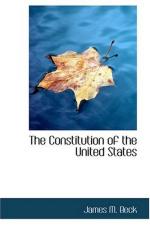Author’s Introduction
This book is a result of three lectures, which were delivered in the Hall of Gray’s Inn, London, on June 13, 15, and 19, 1922, respectively, under the auspices and on the invitation of the University of London. The invitation originated with the University of Manchester, which, through its then Vice-Chancellor, Dr. Ramsay Muir, two years ago graciously invited me to visit Manchester and explain American political institutions to the undergraduates. Subsequently I was greatly honoured when the Universities of Cambridge, Edinburgh and London joined in the invitation.
Unfortunately for me—for I greatly valued the privilege of explaining the institutions of my country to the undergraduates of these great Universities—my political duties made it impossible for me to visit England prior to June 1, about which time the Supreme Court of the United States, in which my official duties largely preoccupy my time, adjourns for the summer. Any dates after June 1 were inconvenient to the first three Universities, but it was my good fortune that the University of London was able to carry out the plan, and that it had the cordial co-operation of that venerable Inn of Court, Gray’s Inn, one of the “noblest nurseries of legal training.”
Thus I was privileged to address at once an academic and a professional audience.
I came to England for this purpose as a labour of love. I had no anticipation of success, for I feared that the interest in the subject-matter of my lectures would be very slight.
My surprise and gratification increased on the occasion of each lecture, as the audiences grew in numbers and distinction. Many leading jurists and statesmen took more than a mere complimentary interest, and some of them, although pressed with social and public duties, honoured me with their attendance at all three lectures. How can I adequately express my appreciation of the great honour thus done me by the Earl of Balfour, the Lord Chancellor, Lord Justice Atkin, the Vice-Chancellor of the University of London, and many other leaders in academic and legal circles—not to forget the Chief Justice of the United States, who paid me the great compliment of attending the last lecture. To one and nil of my auditors, my heartfelt thanks!
I also must not fail to acknowledge the generous space given in the British Press to these lectures, and the even more generous allusions to them in the editorial columns. An especial acknowledgment is due to Viscount Burnham and The Daily Telegraph for their generous interest in this book. The good cause of Anglo-American friendship has no better friend than Lord Burnham.
This experience has convinced me that now, more than ever before, there is in England a deep interest in American institutions and their history. This is as it should be, for—for better or worse—England and America will play together a great part in the future history of the world. In double harness they are destined to pull the heavy load of the world’s problems. Therefore these “yoke-fellows in equity” must know each other better, and, what is more, pull together.




